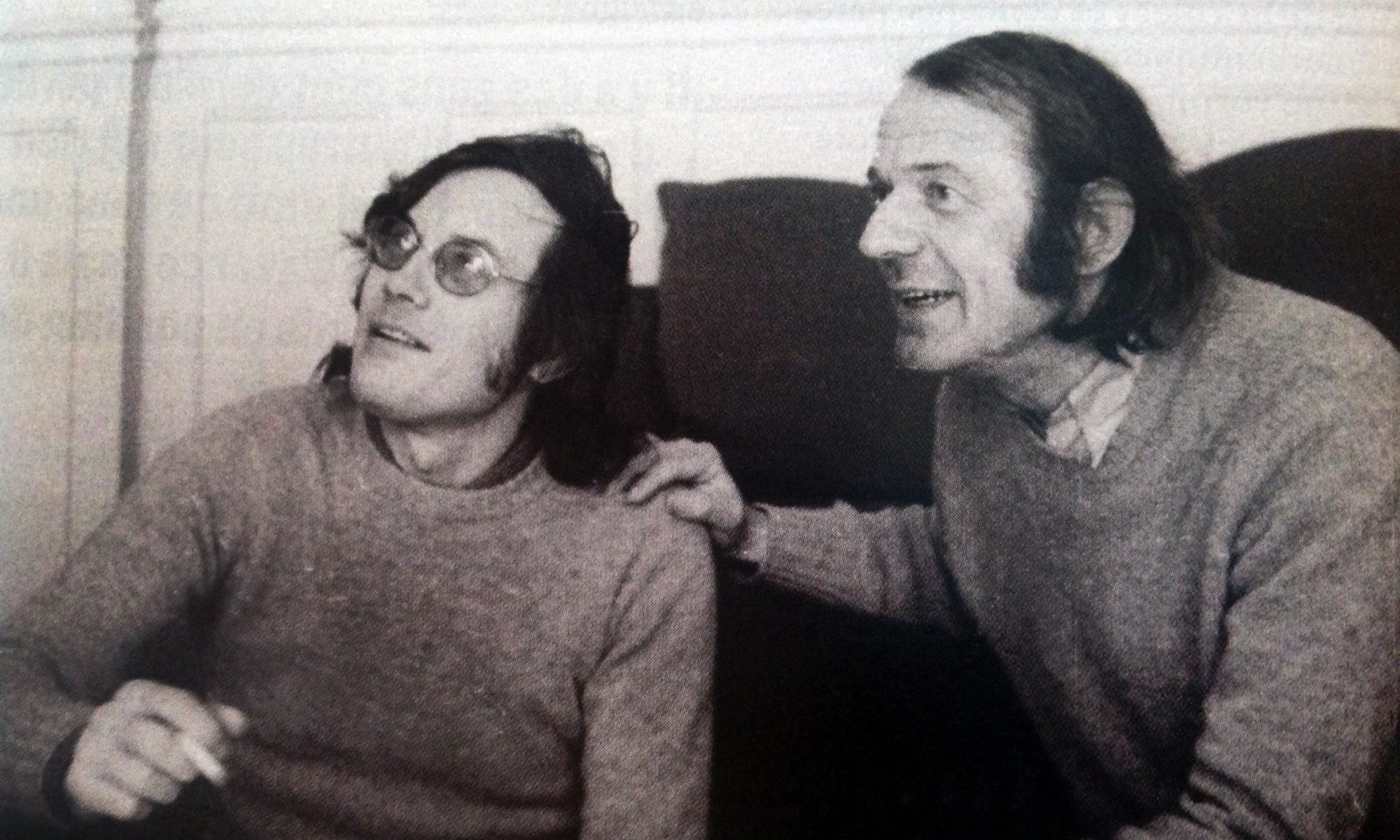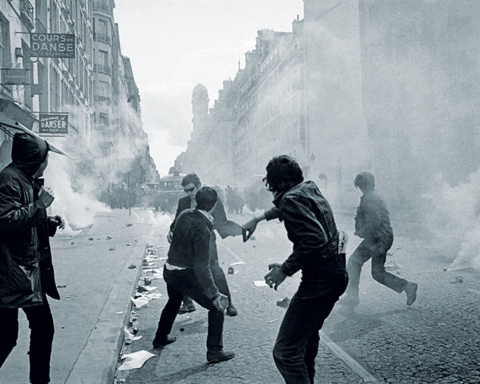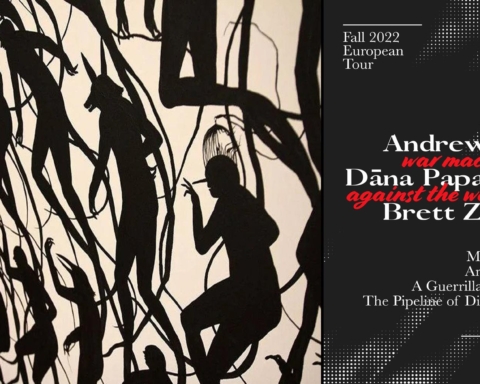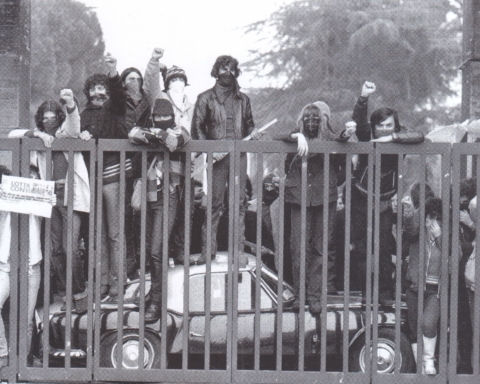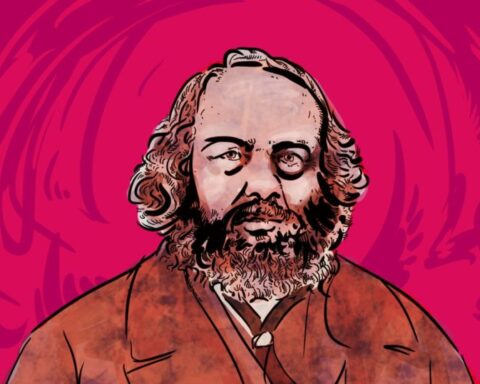by Andrew Ryder.
Félix Guattari is widely discussed among philosophers, particularly feminists and specialists in ecology and technology. But in the Anglophone world, political organisers tend to ignore him. In part this is due to academic paywalls and university strictures confining his work, but the problem goes further: the stylistic conservatism of so much of the Anglo-American left has impeded the capacity to learn from his insights, because they are presented in an nontraditional and unfamiliar style. This resistance has obscured his continuing activity as a participant and organiser in a variety of international struggles.
This is not merely of historical interest; these practical and conceptual experiences may prove to revitalise contemporary projects. Marxism has experienced a series of crises around the question of the relationship of “identity” to fundamental economic structures. Guattari contributed new ways of thinking and practicing politics that help us rethink this challenge. From a starting point in the Trotskyist movement, he integrated elements of Jacques Lacan’s psychoanalysis. However, his most famous writings were produced in collaboration with a philosopher, Gilles Deleuze. Guattari drew from a revolutionary interpretation of psychoanalysis, in order to express a theory of desire that exceeds the bourgeois family and the individualism it produces.
In his solely authored works, as well as his philosophical projects co-authored with Deleuze, Guattari expanded the Marxist conceptual armoury to help us better understand gender, sexuality, identification with capitalist values, and the necessity of revolutionary organisation. Moreover, his philosophical elucidation of the ‘assemblage’ provides a capacious and materialist way of thinking the interconnectedness of economic and social struggles against exploitation and oppression. His distinct ideas remain evident in rich descriptions of contemporary problems, such as Jasbir K. Puar’s approach to ‘homonationalism’ and Eduardo Viveiros de Castro’s exploration of American indigenous thought. It is helpful to reinvestigate the full scope of Guattari’s work in order to discover tools to assist revolutionary socialists today.
Marxism and Psychoanalysis
Guattari began his career with a dual fidelity; to the Marxist tradition as developed by Trotskyism, and to psychoanalysis as reinvented by Lacan. In the 1950s, French psychoanalysis was shaken by Lacan’s controversial insights. Sigmund Freud’s daughter, Anna, distorted the radical potential of psychoanalysis by advocating the strengthening of the ego (the conscious individual self). Lacan believed that this emphasis on the ego would only intensify social repression and miss the purpose of analysis, which was the discovery of unconscious desire. Especially in the United States, psychoanalysis has often had a history of conservative social practice – particularly in its inscription of a regime of repressive gender norms. In France, however, Lacan pioneered a strongly anti-authoritarian reading of Freud that might be mobilised against the oppression of women and those with same-sex attractions. Guattari’s Marxist politics led him to explore this potential to its fullest.
This outlook attracted the interest of a number of French Marxists. In particular, Louis Althusser commended Lacan and endorsed his views. Although a member of the French Communist Party, Althusser tried to develop an anti-Stalinist critique within it. His circle of intellectuals became increasingly sympathetic to the Chinese revolution and to Maoism, which they believed had overcome the state-capitalist economy of the Soviet Union. In the culturally avant-garde circles of the 1960s, there was a trend toward reading Lacan, Althusser, and Mao Zedong together. In this context, Guattari was unusual in that he was very sceptical of Althusser and Mao, and instead maintained a critical inheritance from Leon Trotsky. For Guattari, the Maoists were puritanical and joyless, and remained wedded to an authoritarian state structure. In contrast, he championed a viewpoint inspired by Trotskyism and the decolonisation movements; this critical viewpoint appeared in a journal he co-edited, titled La Voie Communiste.
Beginning in 1955, Guattari worked at La Borde, a clinic open to patients who were unresponsive to traditional methods. Guattari had no choice but to develop new techniques in order to treat psychosis. Freudian theory makes a distinction between neurosis, the product of excessive repression, and psychosis, arising from a failure to limit imagination by reality. Guattari initially drew from Lacan’s approach. In Lacan’s view, psychotics have not fully entered the Symbolic order; they have not developed an ego separate from the world in which they are immersed. For him, this disorder also carries a certain rigor or truth; psychosis reveals the artificiality of the ego. Lacan’s reading of Freud argues that the ego is a product of social repression and that analytic experience ought to counter it, and instead reveal the unconscious desires of the analysand. Analysis could then understand the social factors that determine ego-formation, and by this means, develop a practice conducive to a new form of subjectivity. The experience of subjectivity, drawing from the realisation of the unconscious as prior to the ego, might allow a renegotiation of the relationship with the social order. It was this potential that Guattari would go on to explore.
Rejecting Lacan, Encountering Deleuze
At the end of the 1960s, Guattari began to question some of Lacan’s theses and eventually certain preconceptions of psychoanalysis as a whole. Lacan had been inspired by the linguistics of Ferdinand de Saussure. This framework characterised analysis as attention to signifiers; the unconscious as manifested literally in spoken language. Lacan would come to speak of motérialité, a portmanteau combining the French words for ‘word’ and ‘materiality.’ He read Freud’s insight as the revelation of unconscious drives, through unexpected alternative interpretations of phrases or statements, or errors of communication that could reveal repressed desires. He hypothesised that the unconscious is ‘structured like a language.’ This did not indicate that the mind was comprised only of linguistic elements; rather, he meant that mental phenomena could be understood according to the mechanisms of signification described by Saussure. This attention to alternative interpretations, beyond intentional meaning, could reveal ambiguities in thought and speech that would escape the workings of social repression.
Further, Lacan believed that the apparent fixity of meaning was a product of an individual’s entry into the symbolic order, which required the self-recognition of a distinct ego. He believed that this ego formation, and the symbolic order which registered it, required a process of socialisation within the family. Freud placed emphasis on the profundity of the classical myth of Oedipus, the king who murders his father and marries his mother. In his account of the ‘mirror stage,’ Lacan formalised this myth. He described ego-formation as bound to an imitation of the father’s ability to speak, and enmeshed in relations of hostility, mortality, and sexuality as a result.
While Guattari had been convinced of this in the 1950s, by the end of the subsequent decade he began to question Lacan’s emphasis on the signification of language, and to see this as reliant on Oedipal relations (even in the formalised, abstract form that Lacan gave them). Guattari believed that this would continue to reify social conditions that limit the possibility of creativity. He approached the problem by reconsidering the relationship between individual subjects and social reality. In his efforts to do so, he became inspired by an unusual book of philosophy by Deleuze: Difference and Repetition, published in 1968.
Like Lacan, Deleuze was strongly affected by Saussure’s linguistics. He was also impressed by Althusser’s re-reading of Marx, itself indebted to Freud. However, Deleuze argued that difference could only be properly understood if it exceeded the question of representation. This presented a considerable challenge and modification to Saussure’s model, which presented signification (meaning) as reliant on differences between signs. For Deleuze, changes could be thought as immanent processes in which an element does not signify a secondary meaning; rather, each concept and object in the world could logically participate and affect one another without a process of signifying. That is to say, a concept does not stand in for a material object, but rather each is autonomous – the concept and the object reciprocally affect one another, without priority for one over the other.
Deleuze developed this method partly by attention to historical processes – each historical moment can only be understood by the interconnectedness of all of its elements; but further, this understanding is itself an intervention in the situation, participating among other factors. For example, Deleuze reads the novelist Marcel Proust as demonstrating the active and creative aspect of memory. For him, reminiscence is not simply a representation of the past, but a new process of invention. Over-emphasising the linguistic analysis of social reality would obscure the social process of determination by forces of production and their concrete relations. Deleuze argued that this insight would realise an affirmative mode of thought in which potentiality would be discovered and valorised, rather than confined or judged according to a prior norm. Potentiality described the raw capacity of action of any object or agent; Deleuze chose not to understand things according to their pre-given purpose or origin, but rather by their capacities. Production became an organising principle; representation was set aside in favour of an understanding of mechanisms participating in a world continually created by the multiplicity of entities. For Deleuze, affirmation opened a better awareness of the natural and social forces producing any event, as well as the ability to transform these relations. While this was primarily expressed in formal, theoretical terms, Guattari would apply these insights toward more concrete political problems.
In his essay of 1969, ‘Machine and Structure,’ Guattari applied this way of thinking to structuralism, trying to overcome its tendency to reduce real processes to language, by offering his conception of a ‘machine.’ He argued that subjectivity could be understood without the durability of an ego, rooted in imitation of the father. Lacan had already argued that this ego should be displaced in favour of the experience of desires that exceed it, but Guattari wished to radicalise this and to go further. Machines (both in thought and in practice) would exceed the bounds of Lacan’s signifier and its linguistic frame of reference. The machine, rather than depending on representation (words that could represent things), would be a process that co-implicates creation and interaction. Guattari suggests that the world should be conceived according to interconnected processes. These processes (‘machines’) make up individual and group activity, with each individual process a component of a larger one. This point of view led him to reject Lacan, and to begin a close collaboration with Deleuze. Together, they tried to produce a new creative project that would draw from psychoanalytic ideas, but overcome its reference to social normalisation – through the integration of a Marxist social analysis and political commitment to revolution from below.
Anti-Oedipus
Guattari’s break with Lacan was affected by the reading of Deleuze, but also by concrete events in the world around him. In May 1968, a student strike took place, followed by mass action by workers. These events took place without support by the PCF or its affiliated unions; Althusser was unwilling to break with the party line and refused to condone the strikes. Lacan was initially intrigued by the events, but subsequently took a dim view. He believed that the students were acting out, attempting to derive a reaction from authority figures rather than engaging in the ongoing work of uncovering and renegotiating desire. By contrast, Guattari and Deleuze were elated and inspired.
Behind the stable matrix of the law-giving Father, separating the individual from the desire of the Mother, Guattari identified social power. The Symbolic law existed in the cop and the boss just as much as in the presence of the Father – and indeed, familial authority might even be secondary to these other forms of economic and social power outside the home. To identify the transhistorical law of selfhood with the bourgeois family, then, would lead to reconciliation with a social order built on foundations of authority and domination. In contrast, they saw the new social movements as a vast range of social experimentation. Questioning and rejecting the police along with the family opened the possibility of practical changes in the condition of possibility for individual understanding, beyond the limits of the clinic or therapy.
The 1968 movement advocated a transformation of everyday life and refused the confinement to the economic sphere or to improved consumer goods. The militants of these events demanded a rethinking of the family order and of social taboos and restrictions around sexuality and creativity. This revolutionary outlook, then, confronted the structures and institutions that created an alienated experience of life. Deleuze and Guattari believed that their affirmative philosophy could add new conceptual tools in order to assist and mobilise this new spirit of liberation. They gave a new meaning to the notion of ‘alienation’; original human nature could not be retrieved and liberation could never be the recovery of a prior innocence. Yet, May 1968 showed that the social relations of the capitalist order repressed and limited the multiplicity and potential of the world, rendering subjects alienated in their inability to experience collective creativity. In their view, revolution would invent new forms of community.
In 1972, Deleuze and Guattari published Anti-Oedipus: Capitalism and Schizophrenia. This book developed the earlier philosophical criticism of representative thinking, applying it to society and the mode of production. It was not only inspired by the May 1968 events, but also had a decisive effect on many revolutionaries of that generation, who believed that the book captured the new economic, social, and political realities of the era. Deleuze and Guattari argued that psychoanalysis misconceived consciousness as a theatre (a stage in which psychodramas are acted out), and instead psychic experience ought to be understood as a factory; a place of production. They were cognisant of Althusser’s theory of ideological state apparatuses, which materially produced individual subjects. The apparatuses produce certain capacities, skills, and bodies of knowledge, but they also transmit obedience to political authority and susceptibility to economic exploitation. However, they rejected the notion of ideology insofar as they believed that it was still too bound to questions of meaning and interpretation. They did not view ideological critique as fundamentally about the correction of false consciousness, which could be dispelled by a scientific viewpoint.
Instead, they argued that capitalism acted to set constraints on possible associations and activity, through channelling collective desires. Capitalism had the inevitable effect of inciting new needs and desires for individuals and groups, which it tried to satisfy through commodities (as well as disciplining the class through the coercive arm of the state). However, Deleuze and Guattari argued that the revolutionary struggle of workers would naturally exceed any satisfaction that could be offered through consumerism, or the punitive mechanisms of the law. They believed that working-class self-activity was inherently more affirmative and more active than the methods of punishment and reward offered by capitalist structures or institutions.
Deleuze and Guattari on Revolutionary Organisation
There is a common tendency to read Anti-Oedipus as an uncritical celebration of anarchic, undisciplined activity and romantic excess. For example, Alain Badiou and other French Maoists of this period called them ‘anarcho-desirers.’ However, a close reading of the book counters this impression, particularly in light of Guattari’s lifelong activities. Deleuze and Guattari do not call for hyper-individualism. Rather, they called for a new type of revolutionary group that could effectively counter recuperation by the capitalist state. In contrast to the contemporary doxa, which some have called ‘anarcho-liberalism’ – an emphasis on local struggles, modest demands, unstable structures, and proceduralism – Deleuze and Guattari always insisted on the need for organisation, and the ultimate goal of a new society. As Deleuze wrote in a preface to Guattari’s writings, published the same year as Anti-Oedipus: ‘Clearly, a revolutionary machine cannot remain satisfied with local and occasional struggles: it has to be at the same time super-centralised and super-desiring.’ This emphasis is explicit in a later book by the two authors, A Thousand Plateaus. There Deleuze and Guattari define their problem as ‘that of smashing capitalism, of redefining socialism, of constituting a war machine capable of countering the world war machine by other means.’ They stipulate that this war machine will avoid ‘the war of extermination’ and ‘the peace of generalised terror,’ but rather proceed toward ‘revolutionary movement.’ Guillaume Sibertin-Blanc describes this problematic as ‘neo-Leninist.’ He emphasises Deleuze and Guattari’s conception of the socialist ‘war machine’ by its distinction from state organs. In this regard, their viewpoint demands collective organisation from below, without emulating prior authorities. This war machine would emerge from situated experience, but would also refuse any limitation to a single sphere of struggle – the social, economic, and cultural would be practically intertwined.
Deleuze and Guattari express ambivalence about the Leninist legacy. In Anti-Oedipus, they admire Vladimir Lenin’s command of slogans and his ability to produce new modes of power, new popular machines. By declaring ‘All power to the Soviets’ at the right moment, Lenin was able to harness desires that exceed and overpower the state. However, they saw the historical circumstances of that time as necessitating the transformation of this novelty into a new form of state capitalism. They believed that the degeneration of the Communist Party of the Soviet Union produced a faulty organisational form, incapable of accomplishing a socialist revolution. ‘Leninist’ parties of their time, including the orthodox-Trotskyist variants, did not successfully reinvent the possibility of revolutionary organisation. Guattari believed that this could be done by creating a new revolutionary group that could coordinate and deepen various social struggles, transforming its members by their shared commitment to diverse fights against oppression.
They did not deduce an apathetic or individualist conclusion from their critique of the Stalinist legacy. While Deleuze’s work was primarily theoretical and philosophical in nature, Guattari remained actively committed to various social movements of his time. These included the beginnings of the LGBT movement in France, workers’ and students’ activity in Italy, and diverse social movements that countered the Brazilian military dictatorship. All of these social struggles should be studied further, and Guattari’s involvement in them is of considerable significance.
Guattari and International Social Movements: France, Italy, Brazil
Anti-Oedipus had immediate effects on French social movements. Among these was the beginning of what was then called the ‘gay liberation movement.’ In France, the Homosexual Front for Revolutionary Action (FHAR) was among the first organisations to demand social equality for lesbians, gay men, and bisexuals. In addition, the group had a conscious anti-capitalist political perspective. The group’s founder, Guy Hocquenghem, took inspiration from Anti-Oedipus. The desire to overcome the bourgeois family, and to reveal it as bound to other forms of social authoritarianism, inspired a practical and theoretical rejection of heteronormativity (to apply a later term produced by queer theory). Guattari helped to organise and publish the FHAR’s first public pronouncements, as well as arranging support from Jean-Paul Sartre, Michel Foucault, and others. This led to political repression of the publication as well as legal action against Guattari himself, who was fined for his ‘affront to public decency.’ Guattari publicly defended himself and the right to expression of the FHAR, in a landmark case for French gays and lesbians. Guattari was also among the first French intellectuals to defend the rights of transgender people in France and abroad. In his defense of the FHAR, Guattari said:
This is, in fact, more about transsexuality than homosexuality: at issue is the definition of what sexuality would be in a society freed from capitalist exploitation and the alienation it engenders on all levels of social organisation. From this perspective, the struggle for the liberty of homosexuality becomes an integral part of the struggle for social liberation.
Guattari’s social commitment on this matter cleaved with his philosophy. In his writings with Deleuze, Guattari described a process of ‘becoming-woman’ that could alter the potential of one’s own body. This concept could include concrete transgender experience, as well as conceptual, imaginative innovations that may not involve an individual permanently transitioning from one gender to another. He saw such practices as politically valuable, because they free desire (in thought and action) from the constraints put on it by the capitalist order. A new vision of solidarity, beyond fixed, identity, is at stake here; rising from a struggle to change the way the body and mind has been conditioned by an alienated society. Guattari met with organisations that defended transgender people outside France; these included the Gay Group of Bahia, in Brazil. These practical gestures of solidarity and experiences of new social struggles enriched his understanding of global potential for collective reshaping of desire.
Despite their novelty of expression, the FHAR did not have a good understanding of the particular oppression of women and lesbians in capitalist society. As a result, in 1971 a separate group, the Goines Rouges (Red Dykes) split off. Their most famous figure, Monique Wittig, drew from the work of Deleuze and Guattari in order to dissolve sexual difference itself; she paraphrased their emphasis on singularity to contend that there are “as many sexes as individuals.” In this reading, Deleuze and Guattari’s position could be martialed in favour of a feminist strategy of gender abolition. However, others have subsequently received their work differently. Rosi Braidotti and Elizabeth Grosz believe that their emphasis on embodiment over representation is compatible with a contemporary approach to sexual difference that acknowledges the excess and contingency of sexed bodies. This draws in part from the reception of their ideas by feminists in Italy.
Anti-Oedipus and Guattari in particular were extraordinarily influential for the Italian left of the 1970s. Anti-Oedipus was translated into Italian in 1975, where a social crisis was taking place. With a high degree of unemployment, government austerity measures, and widespread dissatisfaction with the economic and political order, many young people sought out a revolutionary path. As François Dosse writes, a ‘series of far-left Italian currents found a new language in the theses of Deleuze and Guattari, notably in Anti-Oedipus […] and the notion of ‘desiring machines.’’ In September of 1977, Guattari appeared at a great colloquium in Bologna, comprised of people who organised and acted for politics beyond the official left. These included feminists, gay and lesbian groups, as well as workers’ organisation. As Guattari’s friend, the painter Gérard Fromanger, recalled:
This was the first time that we had seen a demonstration of twenty thousand young women shouting and making the ‘pussy’ sign with their hands. It was so beautiful! That was the first time we saw that it was possible! Women Power!
Guattari was regarded as a leading figure in this movement. He became friends with another radical philosopher, Antonio Negri. By 1978, the situation in Italy had become violent; the revolutionary movement had split between a terrorist wing, the Red Brigades, and forces based in more mass-oriented politics (like Autonomia Operaia, Negri’s group). The state was able to take the violence of the terrorist groups as a pretext to repress the movement as whole. The Italian state prosecuted Negri and held him responsible for the Red Brigades, in a famous and protracted episode of persecution. Guattari himself attempted to defend Negri and others.
In addition, Guattari drew on his own fame and reputation in the Italian scene in order to dissuade young militants from adopting terrorist tactics. Guattari became concerned that solidarity was becoming eroded by particularism, and that struggles in Europe were no longer communicating with one another. In a later discussion, he cites the case of a feminist group that split from Lotta Continua, one of the Italian revolutionary organisations. While the new feminist group made a number of theoretical and practical contributions, the splitting into smaller groups and the inability of them to communicate with one another was very detrimental to the Italian struggle. He tried to overcome this sectarianism in subsequent activities.
In the early 1980s, Guattari became interested in the Brazilian social movements, in danger of repression by the military dictatorship of João Figueiredo. In particular, he was intrigued by the convergence of popular opposition forces and their ability to work together. Guattari’s experiences in France and Italy had made him increasingly aware of the problems of a fragmented, divided revolutionary movement. As he had argued in his philosophical works with Deleuze, an organisational form capable of overcoming the state was necessary. Guattari hoped that a new revolutionary party could articulate the commonalities among different struggles – the workers’ movement, anti-racism, feminism, gay liberation, and other movements.
In Brazil at this time, the Worker’s Party had some success in coordinating among these different struggles. As Sue Branford and Jan Rocha summarise,
The Workers’ Party attracted traditionally incompatible groups, including Trotskyists, Leninists, Marxist, Catholics from the liberation wing of the Catholic Church, scarcely literate workers and renowned intellectuals. It was the first mass party in Brazil with predominantly socialist ideas and the only mainstream party with activists and political activity outside electoral periods.
As Omar G. Encarnación has documented, the Worker’s Party also coordinated all of these sectors with the beginnings of the LGBT movement, becoming one of the first political expressions of the Latin American queer community. Guattari was fascinated by the possibility that the Workers’ Party could fuse countercultural tendencies with working-class activity. This party formation, he believed, could function as an instrument of the Brazilian masses, guiding a united front against the military dictatorship. He applied the term ‘autonomy’ to refer to a range of liberating practices and workers’ self-activity, which he understood to be critical for developing an organisation’s revolutionary capacity. As he put in, in 1982:
Autonomy is a function. The ‘function of autonomy’ can be embodied effectively in feminist, black, ecological, homosexual, or other groups. But it can also be embodied in machines for struggle on a large scale – as in the case of the PT [Workers’ Party] at this time of electoral campaign.
I really believe that organisations such as parties or unions can be fields in which to exercise the function of autonomy.
In 1982, he interviewed the party’s leader, Luiz Inácio Lula da Silva, who was at that time an idealistic trade-union organiser. Guattari understood that the Workers’ Party would succeed in organising popular forces in order to overcome the dictatorship. Through the early 1980s, Figueiredo presided over a transition to electoral democracy, responding to pressure from below. However, as the 1980s went on, the Workers’ Party shed its revolutionary character and became a more conventional social-democratic organisation. Lula was elected president of Brazil in 2002, after considerably centralising power in his own hands. The party had considerable popularity for years, but was ultimately driven from power after a number of corruption scandals, many of which were trumped-up. At present, Lula remains a rallying point for Brazilian democracy and resistance to new austerity measures.
The Workers’ Party has not answered Guattari’s hopes (and those of Brazilian people). However, his enthusiasm for its early phase was not misplaced. Guattari had the correct intuition that social struggles for different forms of individual empowerment and against social oppression required an alliance with working-class struggle for economic change. Today, it is necessary to reapply his theoretical orientation toward a ‘machine for struggle’ that could win social autonomy, in Brazil and elsewhere. The Workers’ Party ability to fight on multiple fronts, transforming society as a whole, was an early prototype for the capacity to link diverse struggles and to coordinate their potential to unsettle the alienating relations that maintain the capitalist state. Guattari helps us to recognise the various sectors of society whose potential for creativity might one day act as compositional elements of revolutionary agency; in this sense, solidarity is a responsibility to question the stability of our bodies and social practices. The question of politics becomes a collective project of building new revolutionary subjects, through abandoning the selves that capitalism assigns us.
Possibilities Opened by Guattari’s Legacy: Jasbir K. Puar and Eduardo Viveiros de Castro
In collaboration with Deleuze, Guattari developed his concept of machines toward a broader concept, the ‘assemblage.’ In his description, assemblages bring together an assortment of different practical machines. They do not produce a new dialectical unity, but they maintain functioning across disparate elements. Assemblage-theory can describe machines that oppress us, as well as new machines that overcome or exceed this oppression. Jasbir K. Puar, in her essay of 2005, ‘Queer Times, Queer Assemblages’ drew from this approach in order to understand multicultural experience in the world of the twenty-first century. Puar argued that this could present a more dynamic and capacious way of thinking identity and difference, in comparison with another highly influential model, intersectionality. In Puar’s critical presentation, intersectionality ‘presumes components – race, class, gender, sexuality, nation, age, religion – are separable analytics,’ whereas assemblage is ‘a series of dispersed but mutually implicated networks,’ ‘attuned to interwoven forces that merge and dissipate time, space, and body.’ Put briefly, she writes: ‘Intersectionality privileges naming, visuality, epistemology, representation, and meaning, while assemblage underscores feeling, tactility, ontology, affect, and information.’
An assemblage is constructed of imagination and desire, as well as nature and economic production. Puar applies this mode of thought to understand the specific mode of oppression faced by turbaned Sikh immigrants and prisoners. She argues that the social construction of their appearance cannot be understood very well by the addition of various qualities (raced, gendered, or otherwise) but rather can be better thought as formed by a series of complex and interrelated historical relations. She applies the same method to describe what she calls ‘homonationalism’: the re-evaluation of same-sex desire in order to establish a new form of patriotism and imperialist politics.
Homonationalism is an example of a social transformation and recuperation, along lines described by Deleuze and Guattari. Capitalism incites and liberates desires, but then domesticates them toward the ends of the capitalist state. These relations of sexuality, technology, national identity, racial distinction, and class relations cannot be understood independently, but only in their inseparability and co-determinacy. Deleuze and Guattari believed that a mode of thinking more aware of these complex relations, across nature, desire, and technology, would be better suited to produce new assemblages that could counter and overcome the limitations and domination exercised by the state.
They believed that this mode of thinking, towards the assemblage, drew from a variety of twentieth-century innovations in the arts and sciences. However, they also believed that they had rediscovered a more communal way of thinking that preceded the subordination of thought to capital accumulation and state dictates. For this reason, they were fascinated by the thought and practices of indigenous peoples whose societies had not been subordinated by a state. They have been a valuable aid to those who translate and interpret the philosophies of these indigenous populations.
Guattari’s visits to Brazil in the early 1980s had a strong effect on the intellectual culture there. His ideas were picked up not only in radical politics but also in clinical psychology and in anthropology. One result of this was the combination of his way of thinking with attempts to translate and understand the traditional philosophy of Brazilian Indians. Eduardo Viveiros de Castro writes,
The philosophy of Deleuze, and more particularly the two volumes of Capitalism and Schizophrenia that were written with Guattari, is where I found the most appropriate machine for retransmitting the sonar frequency that I had picked up from Amerindian thought. Perspectivism and multinaturalism, which are, again, objects that have been resynthesised by anthropological discourse (indigenous theories, I dare say, do not present themselves in such conveniently pre-packaged fashion!) are the result of the encounter between a certain becoming-Deleuzian of Amerindian ethnology and a certain becoming-Indian of Deleuze and Guattari’s thought.
‘Perspectivism’ and ‘multinaturalism’ are each concepts, as Viveiros de Castro says, that emerge from the study of traditional indigenous thought. They also describe aspects of Deleuze and Guattari’s assemblage theory. The assemblage is a product of multiple interrelated sources and factors; each of these can be recognised as ‘natural,’ and each has an active character, rather than standing as a passive object of knowledge.
Perspectivism is an idea that revises the traditional conception of subjects and objects: Rather than a thinking, perceiving subject who gathers knowledge about a more passive object, as in certain forms of Western thought, American Indians of Brazil posited reciprocal knowledge and interconnected, dynamic relations among many different elements of a situation. This is not the same as a simple relativism where all views are equally correct – some ways of thinking and acting are better than others – but different cultures each have their own means of constructing their world, through experiment, imagination, and interaction.
‘Multinaturalism’ follows from an expanded concept of nature; the idea that human civilisation does not represent a break from natural processes. Deleuze and Guattari insisted,
[W]e make no distinction between man and nature: the human essence of nature and the natural essence of man become one within nature in the form of production or industry, just as they do within the life of man as a species.
This means that there is not a ‘fall’ from nature; the foundation of civilisation has not escaped natural laws, and a prior natural harmony also cannot be restored. Rather, present technology and the extractivism on which it relies takes place within a complex ecosystem in which human and non-human animals as well as botanical and geological formations all of have dynamic relations among one another. This develops Marx’s own views on nature, in that he also saw capitalism as producing an illusory division between society and nature. Deleuze and Guattari (and Viveiros de Castro’s exploration of their work in terms of indigenous thought) respond to the question that Marx poses regarding continuity between the human and natural worlds. In a world wracked by climate change, revolutionary struggles need to be imagined in ways that do not presume a passive nature, ready to be mastered by human technology. Rather, new political projects will draw from profound understanding of nature’s autonomous potential.
Indigenous communities are now at the forefront of anti-capitalist struggle, particularly in South America. Jeffery Webber has written powerfully of the ‘left-indigenous movements [that] increasingly come into confrontation with the compensatory state and the extractive model of accumulation,’ in Bolivia and elsewhere. However, indigenous resistance has also become startlingly significant in North America, with the Dakota Access Pipeline protests at Standing Rock Indian Reservation, which began in 2016. In order to relate to these movements and to treat indigenous thought and lands with respect, we must re-think some of our own categories. Deleuze and Guattari’s ideas proved helpful in this respect for Brazilians, and their innovations may assist us in becoming more open to indigenous concepts and understandings in the Anglophone world, as well.
Guattari contributed intriguing new ways of thinking and extended the tradition of philosophical creation. However, I insist that he developed these ideas as interventions to assist the social struggles of his time. To some degree, his work has become relegated to academic life or to the realm of aesthetic theory. His ideas should be reconsidered, though, for their process of development alongside the great collective practices of the late twentieth century – not only the insurrection of 1968, but feminism, the LGBT movements, and decolonisation struggles. His thought is not the disconnected or hermetic production of an eccentric, but born of practice and conversation with mass events. We ought to receive his critique of identity as produced by alienating institutions in capitalist society; but also draw on his work in order to rethink the way that questions of culture and desire can function socially and politically. Guattari can help us think of struggles around anti-racism and gender expression not as battles for representation or inclusion, but the reshaping of desire toward practical solidarity and creative activity.
Thanks to Fainan Lakha for her assistance with this essay.
Andrew Ryder teaches at Texas Christian University. He has written numerous articles on French Marxism, decolonisation struggles in Latin America, and twentieth-century Continental philosophy.
source: Salvage
